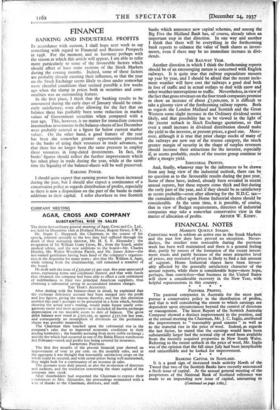FINANCE
BANKING AND INDUSTRIAL PROFITS
IN accordance with custom, I shall hope next week to say something with regard to Financial and Business Prospects in 1938. For the moment, and in harmony perhaps with the season at which this article will appear, I am able to refer more particularly to some of the favourable factors which should affect at least some sections of the Stock Markets during the coming months. Indeed, some of these factors are probably already exerting their influence, so that the year on the Stock Exchange seems likely to close under somewhat more cheerful conditions than seemed possible a few weeks ago when the slump in prices both in securities and com- modities was an outstanding feature.
In the first place, I think that the banking results to be announced during the early days of January should be emin- ently satisfactory, even after allowing for the fact that on balance there has probably been some reduction in market values of Government securities when compared with a year ago. This, however, is no matter for immediate concern inasmuch as investments in the balance-sheets of last December were probably entered at a figure far below current market values. On the other hand, a good feature of the year has been the somewhat greater opportunities presented to the banks of using their resources in trade advances, so that there has no longer been the same pressure to employ those resources in long-dated investments. In fact, the banks' figures should reflect the further improvement which has taken place in trade during the year, while at the same time the liquidity of the balance-sheets will be well preserved.
EARNING POWER.
I should quite expect that earning power has been increased during the year, but I should also expect a continuance of a conservative policy as regards distribution of profits, especially as there is now a disposition on the part of the banks to make additions to their capital. I refer elsewhere to two Scottish banks which announce new capital schemes' and among the Big Five the Midland Bank has, of course, already taken an important step in that direction. In one way and another I think that there will be everything in the forthcoming bank reports to enhance the value of bank shares as invest- ments, even if there may be no immediate increase in divi- dends.
THE RAILWAY YEAR.
Another direction in which I think the forthcoming reports should be of an encouraging nature is concerned with English railways. It is quite true that railway expenditure mounts up year by year, and I should be afraid that the recent incle- ment weather will have cost the' railways a good deal both in loss of traffic and in actual outlays to deal with snow and other weather interruptions to traffic. Nevertheless, in view of the fact that gross revenues on the four trunk companies promise to show an increase of about L7,000,000, it is difficult to take a gloomy view of the forthcoming railway reports. Both as regards the London Midland and Scottish and the Great Western some slight increase in the Ordinary dividend seems likely, and that possibility has to be viewed in the light of the :recent setback in Stock Exchange quotations, so that even a small increase in dividend distribution should make the yield to the investor, at present prices, a good one. More- over, although it is true that prior charge stocks of many of the railways are now out of the trustee category, the much greater margin of security in the shape of surplus revenues should increase their attractions for the investor, especially if, as seems probable, stocks of the trustee group continue to offer a meagre yield.
INDUSTRIAL PROFITS.
And, finally, whatever may be the inferences to be drawn from any long view of the industrial outlook, there can be no question as to the favourable results during the past year. Some of these have, indeed, already been revealed in recent annual reports, but these reports come thick and fast during the early part of the year, and if they should be as satisfactory as seems probable—even after allowing for the N.D.C. tax— the cumulative effect upon Home Industrial shares should be considerable. At the same time, it is possible, of course, that in view of Budget requirements, directors of industrial companies may take a somewhat conservative view in the matter of allocation of profits. ARTHUR W. KIDDY.


































 Previous page
Previous page